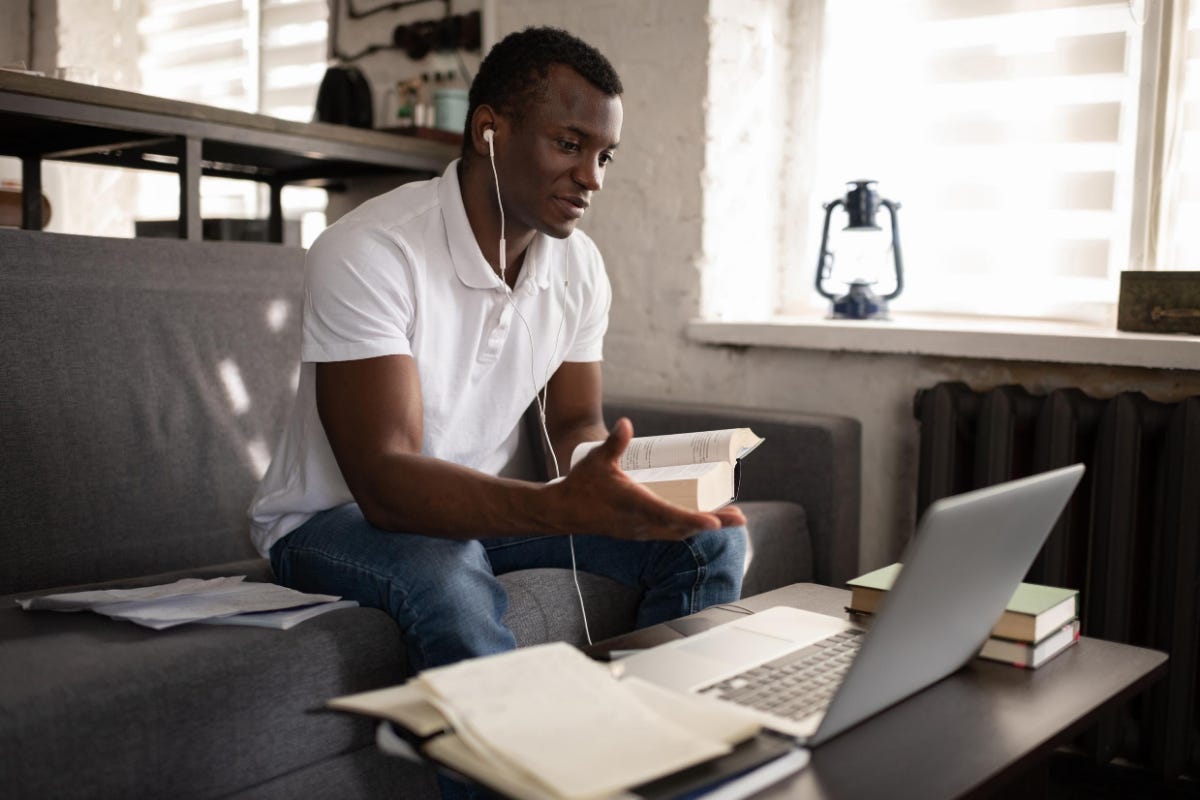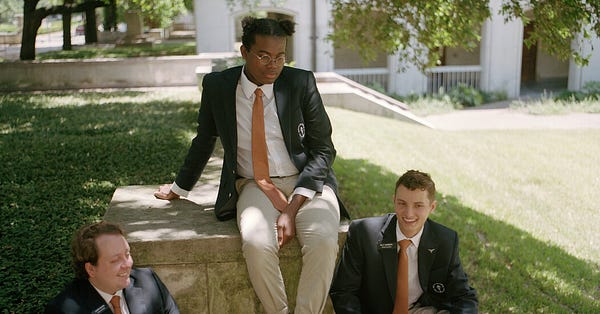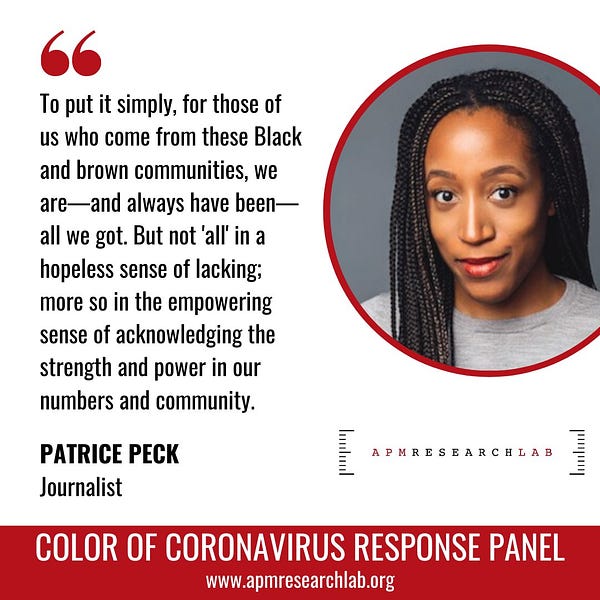How Tech, A.I. Combating COVID-19 Impacts Black People & We're Seeking Black Educators
Plus, racial biases in hospital aid, what's on the horizon for mental health in the Black community, young Black Floridians are disproportionately dying, dental health care disparities & more.
Speak Patrice Presents: Coronavirus News for Black Folks is an independent newsletter that aims to empower our community by sharing coronavirus (COVID-19) news and stories as they relate to the Black Diaspora. We have 1,848 subscribers as of August 20, 2020. Please consider (1) clicking that itty bitty ❤️ at the top of this email next to my name to “like” us, (2) subscribing, and (3) supporting this newsletter by sharing it with your friends and family.

Photo from Canva.com
CALLING ALL BLACK EDUCATORS…
(TL;DR — Black educators needed for upcoming stories! Click the button below…)
Patrice, here, founder of the Coronavirus News for Black Folks newsletter. I hope you all are safe and taking care. With all of the recent coverage of school reopenings, I’m working on publishing some content on how Black people working in and attending schools feel about this issue and how the pandemics impact on education will affect the future of Black children and adolescences and existing racial inequities within Black communities.
To start, I’m seeking Black educators to learn more about their thoughts on school reopenings, the racial inequities revealed in academia during the COVID-19 pandemic, and anything they feel has gone overlooked by the media’s coverage of schools and COVID-19. I’ve been wondering about Black educators who work at predominantly Black schools and in predominantly Black communities, especially hotspot counties; those working at historically Black colleges and universities; those working at mostly- or all-white schools; those who work in special education; those who will be leading virtual classes…basically, I want to hear as many perspectives and experiences as possible to ensure our coverage is intersectional.
If you are a Black educator (or you know of one/some), please consider filling out the quick survey below to potentially speak with me about your experiences during the pandemic:
*In case you missed last week’s post, we’re now doing separate round-up posts about how the coronavirus pandemic is impacting Black communities in the U.S. and in nations outside the U.S. throughout the African diaspora. This post is focusing solely on U.S. news.*
📍 MUST READ U.S. NEWS
Wearable Tech Enters the Fight Against Covid-19
“Fitbit’s own research program, which encompasses 100,000 people in the U.S. and Canada, is catching signs of the disease before symptoms show. So is a 5,000-person study led by Michael Snyder, a professor of genetics at Stanford University. Snyder’s team is now building an algorithm that can scan device data at scale and alert wearers to get tested and self-isolate when signs of infection show. In a sub-analysis of 31 participants who tested positive for Covid-19, Snyder found that 82% had data on their devices that indicated infection — such as an elevated heart rate — at or before the time symptoms appeared.”
—
Is artificial intelligence worsening COVID-19′s toll on Black Americans?
Experts are asking if biased algorithms exacerbate health disparities
“Last fall, a research team published a paper in the journal Science that for the first time attempted to quantify the extent of racial bias in patient care and outcomes. The researchers studied an algorithm developed by Optum, a subsidiary of the world’s largest health care company, UnitedHealth Group…
The way the medical center used the algorithm, the researchers concluded, was not neutral and unbiased. African Americans, for example, comprised just 18 percent of the medical center’s high-risk group when assessed using the algorithm. But when looking at actual patient health data, the Science researchers concluded the high-risk group should have been 47 percent African American. The discrepancy meant that White patients were granted access to resources ahead of African American patients who were less healthy.”
—
An Era of Peril for Black Mental Health
Racial injustice and the coronavirus pandemic have punctuated the mental health burden of many Black Americans.
“…snapshot government data collected last month indicates 4 in 10 Black Americans were struggling with anxiety or depression, while a Centers for Disease Control and Prevention report released Thursday showed that 15% of Black survey respondents in late June had seriously considered suicide in the past 30 days, compared with about 8% of whites. A Congressional Black Caucus report released late last year also notes the suicide rate among Black youths nearly doubled from 2007 to 2017, and that Black children under 13 are twice as likely to die by suicide than their white peers.”
—
Pandemic Threatens to Deepen Disparities in Dental Health
A virus that’s hit African Americans and Latinos hard is also highlighting racial disparities in oral health.
“…a contagion that's hit African Americans and Latinos particularly hard is magnifying racial disparities in oral and dental health, sometimes called the stepchild of the American health system. Black Americans, for example, are more likely than whites to have untreated tooth decay, while older Black adults are more likely to see cost as a barrier to getting maintenance and care.”
—
Study finds racial bias in the government’s formula for distributing Covid-19 aid to hospitals
“The study in the Journal of the American Medical Association found that the funding inequities resulted from a formula that allocated large chunks of a $175 billion relief package based on hospital revenue, instead of numbers of Covid-19 cases or other health data.
The effect was to distribute more money through the federal CARES Act to large hospitals that already had the most resources, leaving smaller hospitals with large numbers of Black patients with disproportionately low funding to manage higher numbers of Covid-19 cases.”
—
The Virus Is Killing Young Floridians. Race Is a Big Factor.
The number of younger adults in the state who died of the disease quadrupled last month, as rising numbers of them tested positive.
“Records also show the people who died from the virus in Florida among the young were disproportionately Black. Among people age 25 to 44, African-Americans make up 18 percent of Florida’s population but have accounted for 44 percent of deaths. Black Floridians over 65 are dying at twice the rate of white residents, but among younger adults, the death rate is nearly three times as high.”
—
“The pandemic has exposed the inequality that exists for Black LGBT people in particular. A 2011 study found that Black transgender people had an unemployment rate of 26%, four times greater than the general population. And one in four Black respondents said they had experienced homelessness at some point in their lives, more than five times the national average. And 34% of Black transgender people live in extreme poverty, reporting a household income of less than $10,000 a year, compared with 9% of Black Americans overall and 4% of the general population.”
🇺🇸 NATIONAL NEWS
“Being Black in America has always meant dealing with a social, political and economic othering. That’s why Black healers like Iman, and mental health workers who specialize in race-based trauma, exist. Now, in the midst of the pandemic, recession and protests against systemic racism and in support of Black lives, some Black people are finding they need resources for their mental health more than ever. Black healers are here to take on that work — while dealingwith their own mental health, and a lack of funding, space and time.”
—
In America, how long you live depends on the color of your skin.
“If Black people had died at the same age-adjusted rate as white people in 2018, they would have avoided 65,000 premature, excess deaths — the equivalent of three coach buses filled with Black people crashing and killing them all every day of the year. Perceptions of health in America depend on who you are. A 2011 survey found that only 55 percent of white people knew about inequalities in Black and white health, compared with 89 percent of Black people.”
—
The Black-White Wealth Gap Will Widen Educational Disparities During the Coronavirus Pandemic
This is a report from Center for American Progress, which is not a news publication but “an independent nonpartisan policy institute.”
“Black families and predominantly Black communities often have fewer economic resources—including less wealth and a smaller tax base—to support remote learning and ensure students have access to the internet and necessary devices such as computers and other equipment…The pressure on parents to provide these additional resources is greatest in communities where families have less wealth and thus less ability to support their children’s online education.”
—
“A nationwide poll released earlier this month from researchers at Harvard, Rutgers, Northeastern, and Northwestern universities found that 52 percent of Black respondents are likely to take a COVID-19 vaccine, compared with 67 percent of white people, 71 percent of Latinos, and 77 percent of Asian Americans.
The Pew Research Center, which reported similar findings in June, found Black Americans are generally more wary of medical researchers and doctors, in addition to being more skeptical of experimental treatments…An even smaller proportion of Black adults, 35 percent, expressed a ‘great deal of confidence in medical scientists to act in the best interests of the public.’
—
CDC analysis of coronavirus hot spots shows people of color are hit hard
“Among 79 counties identified as COVID-19 hot spots, 76 had a disproportionate number of cases among communities of color between February and June…Michigan and South Carolina had the highest numbers of counties with disparities among Black people.”
—
Turning Anger Into Action: Minority Students Analyze COVID Data on Racial Disparities
“Having the chance to explore their own research questions is unusual for undergraduates, and particularly meaningful to students of color. “It feels like science is something that’s been done to us or on us…This experience allows them to do research that they feel is relevant based on the way they’re viewing the world. I’m trying to get them to trust their instincts.”
—
Who Will Get the COVID-19 Vaccine First?
“While Supreme Court rulings make it unconstitutional for government agencies to prioritize one group over another for medical treatments, Harald Schmidt, an assistant professor of medical ethics and health policy at the University of Pennsylvania, tells Complex that policymakers must reckon with the longstanding injustices that led to the novel coronavirus’ explosion in minority communities and can do so by using a suite of tools that already exist to help gauge where the vaccine is most needed.
Among them is a set of criteria the CDC issued in 2009 on how to allocate flu vaccines based on such factors as income, education, unemployment, and housing quality data ranked by neighborhood and socioeconomic status.”
“In Chicago, Black residents are “nearly exclusively” the population experiencing food apartheid, according to a 2020 Gallagher report on the city’s food deserts. Fortunately, there are local start-ups providing fruits, vegetables and difficult to find ingredients more easily. Meet three Black-owned grocery delivery services ready to meet community needs.”
📰 LOCAL NEWS
CALIFORNIA—
‘Black businesses are hurting now.’ Racism, inequality, COVID-19 shatter Fresno business dreams
MINNESOTA—
COVID-19 study finds racial disparity in hospitalizations in Minnesota
MICHIGAN—
Opinion: Even before COVID-19, Detroiters were dying before their time
Whitmer signs order calling racism a public health crisis
LOUISIANA—
How housing patterns may partly explain coronavirus's outsized impact on Black Louisianans
GEORGIA—
Georgia High School Teachers Welcome Students To Online Learning In Viral Video
Distrust of health care system adds to toll in rural Black communities gutted by COVID
UTAH—
A 'perfect storm': New CDC study shows large racial disparity in Utah’s COVID-19 workplace outbreaks
PENNSYLVANIA—
NORTH CAROLINA—
UNC, Duke seek volunteers, particularly people of color, for COVID-19 vaccine trials
NC Central University workers demand hazard pay, more COVID-19 safety measures
💭OP-ED
COVID-19 has driven massive food insecurity. This trend can't continue | Opinion
“A recent study by Northwestern University using Census data found that 4 out of 10 Black and brown families are struggling to feed their families. They're twice as likely to struggle than white families, a disparity that one of the study's authors described as ‘appalling.’”
🎥VIDEO NEWS
Turning out the Black vote amid the coronavirus pandemic
“Amid concerns about the coronavirus pandemic and the reliability of the U.S. Postal Service, voting rights advocacy groups are working to increase African American voter registration and turnout ahead of the 2020 presidential election. Cliff Albright, co-founder and executive director of the Black Voters Matter Fund, joined CBSN's "Red and Blue" to discuss how his organization is adapting to the changing landscape.”
—
Coronavirus in Context: How Black Lives Matter Impacts My Practice
“Dr. Jennifer Caudle, Associate Professor of Medicine at Rowan University, talks to WebMD Chief Medical Officer Dr. John Whyte about the impacts the Black Lives Matter movement has had on the conversations she has with her patients, and how far we've come addressing the racial disparities in healthcare highlighted by COVID-19.”
⚠️NOT CORONAVIRUS NEWS, BUT ALSO IMPORTANT
Black babies are more likely to survive when cared for by Black doctors, study finds
“In the United States, Black babies die at three times the rate of white newborns during their initial hospital stays, according to a peer-reviewed study published Monday in the Proceedings of the National Academy of Sciences. But when Black doctors cared for Black babies, their mortality rate was cut in half.”
—
I’m a Mail Carrier, and Trump Is Definitely Trying to Affect the Election
“Here’s what I’m doing. In addition to going into the community to make sure boxes are properly labeled, I’m keeping $100 in stamps in my glove compartment as I go on my route. You would not believe how many times we have to send mail back because the stamp fell off. Or they mailed off a lot of things and missed an envelope. Especially with older folks, who were most likely to vote by mail anyway. If I see a ballot missing a stamp, I am not sending it back for insufficient postage. I’m gonna slap my own stamp on there and make sure it gets to where it needs to be.”
—
Michigan to Pay $600 Million to Victims of Flint Water Crisis
“The money would largely be designated for children in Flint who were poisoned by lead-tainted tap water after officials changed the city’s water supply six years ago, setting off a crisis that drew national attention and remains a worry for many residents.”
—
A Non-Whitewashed History of the 19th Amendment and Women’s Right to Vote
“…dismantling our current system of rampant disenfranchisement begins with reexamining the misleading milestones and revered figures that are touted in our nation’s history. Therefore, on this centennial, though it is important to recognize the passage of the 19th Amendment, it is even more imperative that we develop the resolve to push on — we must acknowledge and partake in the ongoing fight against disenfranchisement, just as the suffragists who were women of color persevered in their unfinished fight decades ago.”
—
Police Seek Help Locating Man Who Shot Woman In Face, Called Her The N-Word
“A Missouri man is evading authorities after calling a Black woman the N-word, pistol-whipping her and shooting her in the face…She says the shot, which she believes may have accidentally gone off as her attacker was trying to pistol-whip her, halted her ability to hear and has left her in need of plastic surgery to repair her ear. More than a week after the incident, it is unknown if her hearing will ever return to normal.”
—
The fight to save America’s historic Black cemeteries
“Because no official database exists, it’s impossible to track how many historic Black gravesites dot the American landscape. But proposed legislation could change this: the African American Burial Grounds Network Act would create a network of Black cemeteries and a formal database of historic Black burial sites—including grant funding for research and restoration—under the purview of the National Park Service. Support from the park service could increase visitation at these sites and offer a more complete picture of American history.”
✌️TWO QUICK THINGS…
.5) On a sorta lighter note, I appeared on the late-night talk/satirical news show Full Frontal with Samantha Bee this week in a segment about diversity in journalism. Here is said segment "Broken News: There’s A Race Problem in Journalism":
—
.5) I also recently published a piece for The Look, a New York Times column that examines identity through a visual-first lens:


—
2) Earlier this month APM Research Lab, a nonpartisan research organization, asked meto share my thoughts on the data they’ve been independently compiling and reporting for the past few months regarding COVID-19 mortality by race and ethnicity (see: “Color of Coronavirus”.) They specifically wanted to know (1) what I saw in the data they’ve compiled and (2) what I thought they should do about the data.
My responses can be found alongside those of other thought-leaders, researchers, and health practitioners, like physician and founder and CEO of Advancing Health Equity Dr. Uché Blackstock, senior research officer at the Seattle Indian Health Board and director of the Urban Indian Health Institute Abigail Echo-Hawk, and pediatric surgeon and founder of the Black Doctors COVID-19 Consortium Dr. Ala Stanford.
Thank you APM Research for inviting me to participate and for continuing to provide critical data and research on the the most vulnerable communities disproportionately impacted by COVID-19.


Stay safe & take care ✊🏿💗
— Patrice Peck (tw/ig)




